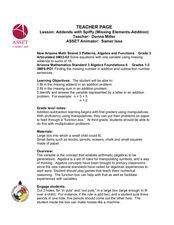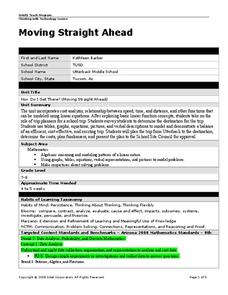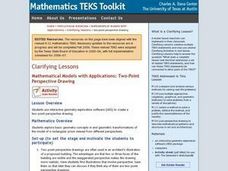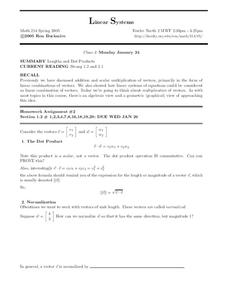Curated OER
Transformations and Exponential Functions
Tenth graders study graphing exponential functions. In this transformations lesson, 10th graders apply inquiry to determine how changes to a parent function affect its graph. Students analyze transformed graphs and generate the function...
Curated OER
A Polynomial Quilt
Tenth graders create polynomial quilts. In this polynomials lesson, 10th graders use concrete models, such as construction paper, to create various shapes described. Students use the FOIL method to multiply terms and to get a square...
Curated OER
Measurement: Perimeter and Area
In this perimeter and area instructional activity, students learn the formulas for perimeter and area and view model problems using tiles. Students work in groups to solve practice problems. Students define perimeter and area and explain...
Curated OER
Bead It!
Fourth graders use colored beads in two problems and explore the use of proportional reasoning as a problem solving method. Working Students, in groups, explain their reasoning strategies orally, and through drawings.
Curated OER
Another Dartboard
Fifth graders solve a word problem that involves predicting probabilities of an event and making deductions from probabilities. They discuss dice and coins and the probability of rolling each number or face of the coin, and in small...
Curated OER
Volume and Surface Area: Which Is More?
Students explore the volume and surface area of three dimensional figures. Through the use of video, students discover three dimensional shapes, their uses in real-life applications, and methods used to calculate their volume and surface...
Curated OER
Chart Your Course
Students explore change represented in graphs comparing distance and time. They exchange and share their graphs. Students interpret and create distance versus time line-graphs, and write stories based on these graphs. They interpret a...
Curated OER
Graphs and Functions
Students are introduced to plotting functions on the Cartesian coordinate plane seen several categories of functions, including lines and parabolas
Curated OER
A Pocketful of Change
Learners study the meaning, symbolism, and value of U.S. coins,
especially the quarter. They conduct a survey of coins in students'
possession, graphing the results to show frequency distribution and drawing
inferences about the U.S....
Curated OER
Impossible Graphs
Young scholars distinguish between possible and impossible graphs of functions, and to learn why some graphs are impossible. They have practiced plotting functions on the Cartesian coordinate plane
Curated OER
Prime and Composite Numbers with use of manipulatives (Elementary, Mathematics)
Students learn what prime and composite numbers are. They learn how to identify them by working in a group and demonstrating an understanding of one work problem with 100% accuracy using the manipulatives provided.
Curated OER
Water Resources
Learners explore the differences between surface water and ground water. They collect data using maps and graphs and investigate a Texas river basin and a nearby aquifer. They complete a written report of their findings regarding the...
Curated OER
More or Less Pigs in the Pen
Students practice simple addition and subtraction. They identify relationships among whole numbers.
Curated OER
Grade 2: Texas Problem Solving
Second graders use numerical data about Texas to write and solve real-life problems involving addition and subtraction (or multiplication and division). They work in pairs to choose three numerical facts about Texas to use to make up...
Curated OER
And Around We Go!
Sixth graders conduct a survey and collect data to construct a bar graph that will then be changed into a circle graph. With the bar graph, 6th graders compare estimated fractions and percentages and estimate percentages. With the circle...
Curated OER
Pepe Cleaners
Seventh graders gather data to determine the relationships between the base and height of rectangles with fixed perimeters and express the relationships using words and symbols. Students build rectangles with pipe cleaners. They create...
Curated OER
Addends with Spiffy
Students solve single variable equations. In this missing addend lesson, students solve problems with missing addends. Students create a function box to help study numerical reasoning.
Curated OER
Moving Straight Ahead
Students analyze the relationship between speed, time and distance. In this math lesson, students plan a school trip. Students determine the efficiency and cost effectiveness of a trip.
Curated OER
Shh...It's a Secret!
Learners explore codes, decode secret messages, and create codes of their own to use with their friends. They examine the use of gestures, letters, symbols and numbers in codes.
Curated OER
Meteorological Predictions
Students make a link between prediction and hypothesis in math and science. Based on data collected over one week, students evaluate the predictions of local weather forecasters, compare the predicted outcomes to the actual weather...
Curated OER
Virtual Field Trip: Lodging and Meals
Students calculate the costs for lodging and meals for a virtual field trip. They calculate the number of nights lodging needed for road and city travel and the number of meals needed, the costs for each, and input the data using...
Curated OER
Putting Your Best Foot Forward
Third graders measure their feet and their parents' feet, record data on computer-generated graphs, and calculate and record mean, median, and mode.
Curated OER
Mathematical Models with Applications: Two-Point Perspective Drawing
Young scholars use interactive geometry exploration software (GES) to create a two-point perspective drawing. They explore basic geometry concepts in and geometric transformations of the model of a rectangular prism viewed from different...
Curated OER
Linear Systems
In this multiplication of vectors worksheet, learners prove that the dot product operation is commutative. They normalize a vector so it has the same direction with a magnitude of one. Students use the angle formula to confirm...

























